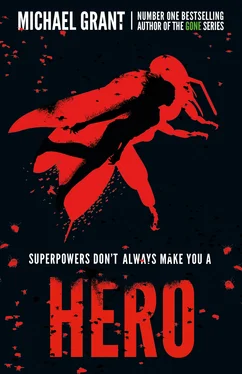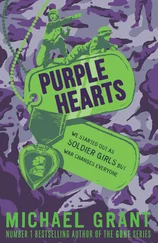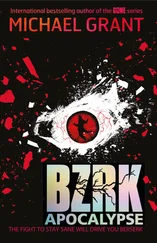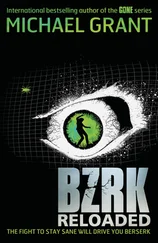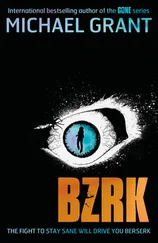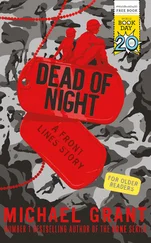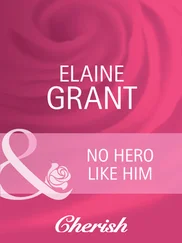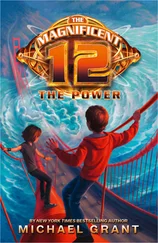“Scared? I was terrified,” Malik admitted. “It’s . . . I don’t even know how to make sense of it.”
“Yeah, it’s weird, huh?” Francis said.
“You have a gift for understatement. There are people who spend a lot of money on drugs and never see anything one tenth as weird.”
“Did you find what you were after?”
Malik considered. “Maybe,” he allowed. “You know what didn’t happen? I did not feel the Dark Watchers. Just like you don’t. Whatever they are, the effect—the Watcher effect—is something in three dimensions that is gone or transformed in n-space.”
Francis nodded politely, but Malik was pretty sure that she was not interested in the physics of it all, let alone the metaphysics. To Francis, it was a trick she could do. It was a power. But she didn’t grasp just how great a power it was.
“They have defenses, those things , those amoeba-looking things,” Malik said. “But I think that’s sort of an automated system, and not very effective. I would guess they are system cleaners, subroutines designed to redirect any random bit of data that takes the wrong turn. But I’m not some random databit, I’m a whole system.”
“So, no more of that, huh?” Francis said, already losing interest and edging toward the door.
“Well, not today, anyway. It’s very . . . unsettling.”
But did he intend to go back to find out what was through that blank hole of nothingness? To seek out whoever was behind this deconstruction of reality? To confront whoever or whatever was screwing with the software of the universe to allow the growth of monsters and destroy human civilization?
Hell yes, I’m going back.
But he wisely said none of that, and instead said, “Shall we go find the others, see what they’re up to?”
| 7 |
MALMEDY IN THE PINE BARRENS |
“DAD. THEY’RE GOINGto kill us.”
“Now you’re being paranoid,” Markovic said. “They’re probably going to put us in a hotel for the night.”
Simone hoped he was right. She tried to push away a growing panic as they were moved by rows to a side door and marched down a hallway. A National Guard private stood there handing out bottles of water and granola bars, smiling, looking normal and sympathetic. It should have calmed Simone’s nerves, but she kept hearing echoes of books she’d read, books about the Holocaust. The Nazis had lulled Jews into a false sense of security as they were sent to die in showers spewing nerve gas.
In the crush of bodies, she was separated from her father. As they reached cold night air, she was stopped from catching up to him and saw her father loaded onto a bus by armed men in black tactical gear bearing no identification patches or badges.
Simone looked desperately for an escape, but there was none. They were in an alleyway loading bay, soldiers to both sides. She in her turn was herded aboard a bus, a borrowed yellow bus with the words “New York School Bus Service” in blue script down the side.
Simone was seated with a woman who, like everyone on the bus, bore the telltale bloody bandages.
“I heard we’re going to a Motel 6.”
“Yeah? My dad seems to think they’ll take us to a suite at the Four Seasons.”
Peering ahead, Simone could see her father’s bus ahead of them, led through panic traffic by black SUVs with lights and sirens going.
They dipped down into the luridly lit Lincoln Tunnel, heading toward New Jersey, and Simone felt the anxiety on the bus grow. As the ride went on and on, complaints grew louder, and demands for a bathroom stop intensified.
They were far from the city now, far from any city. They had left the interstate, and pine trees crowded the road on both sides, interrupted by stretches of marsh.
“The Pine Barrens,” a voice whispered.
Then Simone saw the lead bus slow and turn onto a narrow, pockmarked and unpaved road that dived straight into the woods.
“They’re going to kill us,” Simone whispered. It might have been paranoia earlier, but now she could see it about to play out. It made sense to kill them all; that’s what she’d seen back at Carnegie Hall, that the cold logic of the situation would lead the government to snuff them out fast, before any of them could become a serious problem. Now it was no longer theoretical. There was no other explanation.
“They’re going to kill us!” Simone yelled, standing up. Her seat partner gaped at her in disbelief.
The armed guards—one at the front, one at the back, both bristled and brought their weapons to bear on her. For a moment Simone was too appalled to react: they were pointing guns at her. At her!
“Sit down, please,” the guard at the front said. “We’re just taking a bathroom stop at a park restroom facility.”
That calmed most, and Simone heard nervous relief laughter, but she felt in her bones that it was a lie. What was she going to do? What could she do?
She sat back down, hands twisting on her lap, and tried to hold her head still so as not to restart the headache that was receding at last, replaced on her list of physical woes by the fiery, insistent itching of her many puncture wounds.
Ahead the bus pulled into a clearing, silvery and vague in the faint starlight, eerily bright where the headlights illuminated grass and mud. There were some picnic tables that looked as if they’d never been used, and, sure enough, there was a wooden building marked with bathroom signs. Simone felt the collective sigh of those around her, saw their scornful looks at her, the girl who had panicked and started yelling about being killed, ha, ha, ha.
“Okay, we are taking a break,” the guard announced. “Everyone off, and line up. We’ll bring you up in groups of six to use the restroom.”
Simone, abashed but not reassured, filed off the bus with the others and headed toward the restrooms. But a man in black tactical gear with a balaclava covering his face held up a hand and pointed them to a space yards away. “Line up there. Three rows.”
Then Simone saw the camouflage-painted military truck parked beside the clearing, a dark green canvas cover over the back.
Simone tried to make her way to her father, but here there were still more men and women in black tactical gear holding assault rifles, insisting that everyone line up.
“Line up! Line up!” an authoritative voice shouted. They did. They lined up. Three rows of about thirty people per row.
And that’s when the canvas cover of the army truck was raised.
Simone stared at the perforated black tube of a machine gun’s barrel.
“No!” she screamed. “No! No!”
The machine gun opened fire, spitting tracer rounds that flew like rocket-powered fireflies in the darkness.
Bap-bap-bap-bap-bap-bap!
Screams. Screams from everywhere, including from Simone’s own throat.
Simone turned and ran in blind panic—no reasoning, no plan, just run from the machine gun! Run! Something punched her hard in the back and she fell on her face, hands sinking into soft, wet soil. She heard her own voice whimpering. She tasted mud.
The machine gun roared on, relentless, the well-oiled steel parts pushing rounds out of the belt, striking the percussion caps, exploding the gunpowder, propelling the thumbtip-sized slugs down the rifle barrel, then kicking out the used brass casing and pushing the next round into place, many times each second. Tracer rounds flitted inches above her back, so close she could feel the breeze.
Screams of terror came from all sides, screams and cries and pitiful demands to know, “Why? Why?” and the grunts of those who were beyond words and would soon be beyond all pain.
The machine gun stopped, and the still-living who could move ran or crawled. But now the black-clad guards, faces behind balaclavas, began shooting, a higher-pitched sound of assault rifles. Simone raised her head and saw a child shot in the back. His mother screamed and crawled to him and was shot in the neck.
Читать дальше
